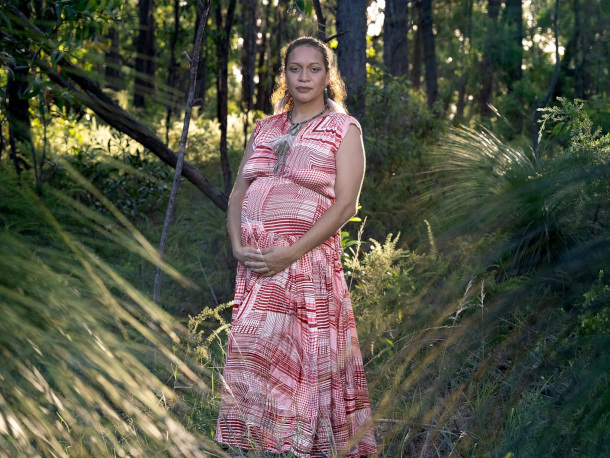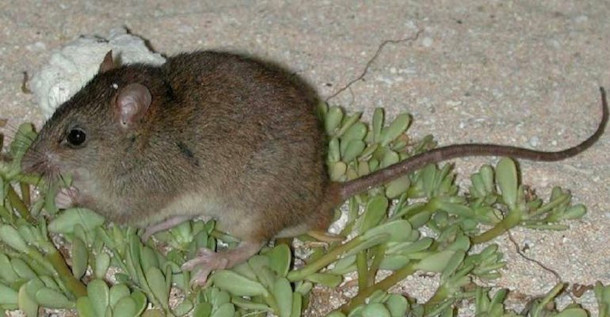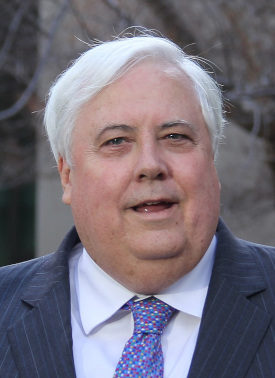First Nations Stop Australian Coal Mine
Air Date: Week of May 31, 2024

Murrawah Maroochy Johnson fears that climate change will lead to the full assimilation of Indigenous people in Australia. (Photo: Courtesy of the Goldman Environmental Prize)
First Nations people in Australia saw plans to build an enormous new coal mine in Queensland as a threat to their culture, so they went to court and won. Murrawah Maroochy Johnson is a Wirdi woman from the Birri Gubba Nation who was awarded a 2024 Goldman Environmental Prize for her leadership in stopping the coal mine. She joins Host Jenni Doering to share the significance of land and water to her people.
Transcript
DOERING: Australia is facing severe climate impacts, from massive wildfires to coral bleaching in the Great Barrier Reef. But the country is also rich in coal reserves, and if extracted and burned, they could push the climate into even more dangerous territory. In 2019, the developers of an enormous new coal mine sought final approval from the Queensland government. The mine was projected to add over a billion and a half tons of carbon dioxide to the atmosphere over its lifetime. And local First Nations people saw those greenhouse gas emissions as a threat to their very cultures. So a young member of the Birri Gubba Nation, Murrawah Maroochy Johnson, mounted an innovative legal challenge arguing the coal mine would violate her people’s human rights. First Nations witnesses even hosted members of the Land Court of Queensland “on country”—in other words, on their ancestral lands—to give testimony about how the climate crisis has already impeded their ways of life. And in 2022, the Land Court ruled that the government of Queensland should reject the coal mine. For her leadership, Murrawah Maroochy Johnson was awarded a 2024 Goldman Environmental Prize for Islands and Island Nations, and she joins us now. Congratulations and welcome to Living on Earth!
JOHNSON: Thank you very much. I'm excited to be here.
DOERING: So first, who are you and where do you come from?
JOHNSON: So my name is Murrawah Johnson. I'm a Wirdi person from a part of the broader Birri Gubba nation in North and Central Queensland, so the largest First Nation in Queensland. We stretch pretty much along a huge chunk of the, the east coast of Queensland. We have multiple language dialects. I'm a part of the Wirdi language dialect which is the central and southern dialect of the Birri Gubba peoples.
DOERING: So please tell me about the Waratah coal mine that you fought and defeated. Where would this have been?
JOHNSON: So the Waratah coal mine was proposed to be in the Galilee Basin. And so the Waratah coal mine, actually the Galilee coal mine, was proposed by billionaire Clive Palmer. Billionaires love to build coal mines. It's proposed actually to be, originally to be about four times the size of the Carmichael coal mine, which at the time was the largest new coal mine in the southern hemisphere, the second-largest new coal mine in the world, and the Galilee coal project by Clive Palmer and Waratah was supposed to even dwarf that project. And so we're talking about a huge, huge scale here. It was proposed to be on the Bimblebox Nature Reserve, which sits on Wangan Jangalingou country. I'm also a Wangan Jangalingou person. In the climate context, this coal mine itself really posed a huge threat. Especially after the Adani Carmichael coal mine was allowed to get up and sort of, again, open up the Galilee Basin, which is one of the largest, really untapped coal reserves in the world. And so, in this day and age, we can't be building new coal mines, and we can't be opening new coal reserves as well.
DOERING: You mentioned that the Galilee Basin has a lot of coal, but I understand it's also a significant place to your people. Why is that?
JOHNSON: For First Nations people in Australia, we are the longest and oldest living culture in the world. And so our creation stories as well. The story of the rainbow serpent the Mundangarra, the Warnayarra, Gubulla Munda, goes by many, many names. The story of the Mundangarra is actually the oldest living story in the world as well. And so the Mundangarra or the rainbow serpent, our creator being, is a water spirit. And so for us, it's about maintaining the health of water, gamu binbi. So binbi means good. It means pure. It means life. For us, if the water is poisoned, then so are we. If the land ceases to exist and be recognizable to our people, who do we then become as a people? My dad always had this saying, "Without our culture, we have nothing, but without our land, we are nothing." In the face of climate change, it's a little bit morbid, but what I worry about is that, and I think what motivates me, is really that what colonization hasn't already done to our people in terms of significant loss to our ways of being, I really fear that what colonization hasn't done to us, climate change will do. And so without their cultural identity, our people effectively cease to exist, and the assimilation process of Australia is complete.
DOERING: Tell me more about that, please. What does climate disruption look like in Queensland and in your indigenous lands?

The Bramble cay melomys is thought to be the first mammal to go extinct directly because of the climate crisis. Sacred to some Indigenous communities in Australia, the extinction has disproportionately impacted First Nations people. (Photo: Government of Queensland, Australia, Department of Environment and Heritage Protection, Wikimedia Commons, CC BY 3.0 AU)
JOHNSON: Yeah, thank you. So there's the really physical, obvious impacts such as rising sea levels in the Torres Strait. And for, you know, seafaring people, island people, the unpredictable weather, unpredictable waters, makes it so much more dangerous to actually go out and to traditionally hunt fish, to travel and maintain traditional trade relationships between the islands, to have the materials from certain islands, certain places, to perform certain cultural ceremonies. And so we're seeing real threat to life, whether you're on the island, and there's been a drought, and so the island could burn like that, or whether you're out on sea country, the waters are unpredictable. The sun is so hot that elders that have never ever been sunburned in their life are now experiencing the worst effects of being out in the sun. And it's really having significant health impacts for people as well. But the other side of it is also the disappearance of species as well, because we hold our wildlife species in high regard and to the extent of actually relating to them and identifying with certain species depending on which subsection of your tribal or nation group that you identify as. And so, already mass die-offs of flying foxes is having a cultural impact for some of our witnesses who were on the court case as well, but also some of our witnesses who are based in the Torres Strait on Erub Island, since the court case saw the loss of one of the native rat species, which might sound insignificant, but it's the first marsupial to actually become extinct from the direct impacts of climate change. And so as more of our species that we relate to and identify with disappear, we're really going to see the significant impacts that that has on culture, more and more into the future.
DOERING: So you mounted a legal fight against the Waratah coal mine highlighting these impacts. And I understand that something really unprecedented happened when the Land Court of Queensland decided to hear your case. Can you tell me about that, please?

Clive Palmer attempted to build a coal mine on Bimblebox Nature Refuge. Activists stepped in and set a new legal precedent in Australia. (Photo: Jwmcdonald81, Wikimedia Commons, CC BY-SA 4.0)
JOHNSON: Yes, so it's the first time that a coal mine, or the objection to a coal mine has been considered based on human rights grounds in Australia. Australia doesn't have a uniform federal human rights legislation. But at the same time, the Queensland charter specifically outlines that the cultural rights of Aboriginal Tosha Islander people are also recognized as human rights. So that is unique in and of itself. Then the really sort of, I think, significant developments followed, because as we began to take evidence from our First Nations witnesses, which became clear to us that their intellectual property and their cultural knowledge is not just in lay witness evidence, but this is expertise in of itself. And it's expertise that's been passed down for thousands of generations. There has to be room for that to be considered as more than just lay witness evidence. That really began the conversation for us where we were able to push for on-country evidence and concurrent evidence. The on-country evidence is that decision makers need to go and see the places that are affected by the decisions that they make. That's first and foremost. We actually took the president of the Land Court, and the entire court and Waratah themselves on country to see the impacts that climate change is already having to culture of our First Nations witnesses, especially to argue that these impacts are going to be worsened by the approval of a huge new coal mine in Queensland.
DOERING: So how did you actually get your message across to the Land Court?
JOHNSON: Our witnesses, they are amazing. Their cultural authority and knowledge is second to none. For example, we went up to the Torres Strait, they had taken the entire court out onto the ocean and given them a tour of country, and taken them to parts of country that not necessarily everybody gets to go to, but really showed them, "See this sand island here. This is where a lot of the birds that are significant to us nested, and now there's no more grass there. And now there's, the sun's too harsh. It's just changing beyond recognition. And so it's really impacting sort of our ability to depend on the weather cycles, the seasonal cycles. The reality is that it's causing really severe disruption to the ability to not just maintain culture but communities themselves."

Murrawah Maroochy Johnson worked with lawyers and activists from her community to fight against the coal mine. (Photo: Courtesy of the Goldman Environmental Prize)
DOERING: So you actually won this case. What kind of a legal precedent do you think this win sets?
JOHNSON: Oh, well, for one, it's the first time a coal mine has been rejected based on human rights grounds in Australia. It's the first time the substitution argument has been rejected as well, which essentially argues, if we don't build this coal mine, somebody somewhere else is going to build it. So it's a negating impact to climate if there is any anyway. That in and of itself is really significant.
DOERING: Murrawah Maroochy Johnson is the recipient for islands and island nations of the Goldman Environmental Prize for 2024. Thank you so much, Murrahwah.
JOHNSON: Thank you so much for having me. I'm really excited to be a recipient of this award, but also to be on this platform and speak with you all today. Thank you very much.
Links
Read Murrawah Maroochy Johnson’s Goldman profile
Learn about the first mammal to go extinct because of climate change
Living on Earth wants to hear from you!
Living on Earth
62 Calef Highway, Suite 212
Lee, NH 03861
Telephone: 617-287-4121
E-mail: comments@loe.org
Newsletter [Click here]
Donate to Living on Earth!
Living on Earth is an independent media program and relies entirely on contributions from listeners and institutions supporting public service. Please donate now to preserve an independent environmental voice.
NewsletterLiving on Earth offers a weekly delivery of the show's rundown to your mailbox. Sign up for our newsletter today!
 Sailors For The Sea: Be the change you want to sea.
Sailors For The Sea: Be the change you want to sea.
 The Grantham Foundation for the Protection of the Environment: Committed to protecting and improving the health of the global environment.
The Grantham Foundation for the Protection of the Environment: Committed to protecting and improving the health of the global environment.
 Contribute to Living on Earth and receive, as our gift to you, an archival print of one of Mark Seth Lender's extraordinary wildlife photographs. Follow the link to see Mark's current collection of photographs.
Contribute to Living on Earth and receive, as our gift to you, an archival print of one of Mark Seth Lender's extraordinary wildlife photographs. Follow the link to see Mark's current collection of photographs.
 Buy a signed copy of Mark Seth Lender's book Smeagull the Seagull & support Living on Earth
Buy a signed copy of Mark Seth Lender's book Smeagull the Seagull & support Living on Earth

